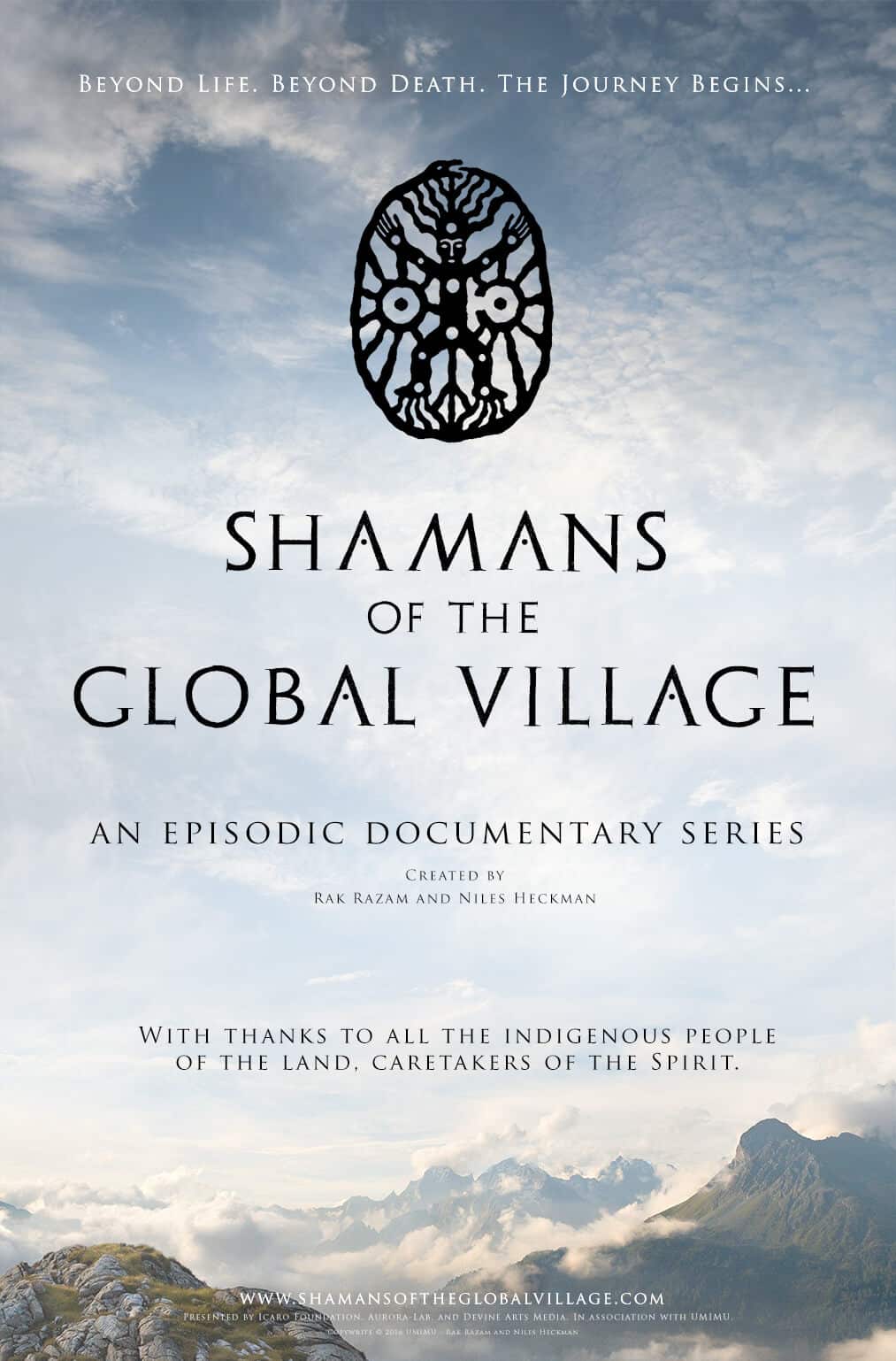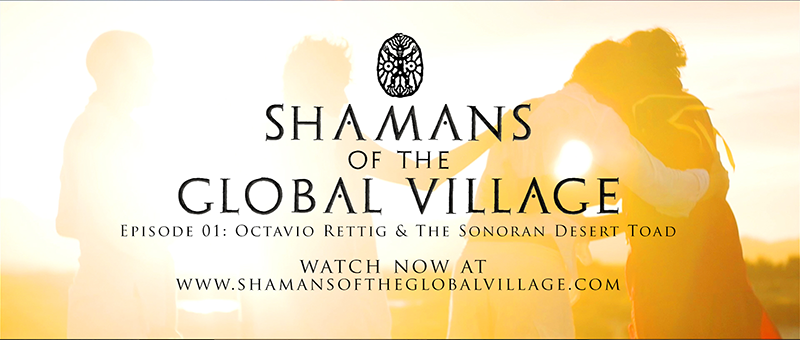The modern Psychedelic Renaissance is proving the science behind mind-altering chemicals may help us relieve the stress and trauma of the modern world. But it’s the relationship with earth medicines, entheogens like ayahuasca and psilocybin and so many more that promise a deeper reconnection with the planetary well of being that we are embedded in. Using ancient shamanic medicines in the right set and setting may not just expand our consciousness, but allow us to embody ourselves in the world. Can we learn the full spectrum of what it means to be well – and to be human – through a partnership with psychoactive plants and their wisdom?
Earth Medicines and Reconnecting to the Web of Life
In the last decade or so, I've become quite a global expert on the Psychedelic Renaissance, and the Shamanic Resurgence. Different plant medicines like ayahuasca and the Sonoran Desert toad (Bufo alvarius), are some of the substances which the earth herself secretes and which tribal people in shamanic societies have a place for. They also have an understanding of how and why they use those things to maintain their own health, their own well-being and their place in the web of life.
What I actually learned when I first went down to Peru in 2006 in the Amazon (as chronicled in the book and film, Aya: Awakenings) is that their indigenous understanding of medicine is very different from ours: they work with all the plants of the rainforest, they have thousands and thousands of different medicines and foods and things they get from the jungle. And they understand and create the right relationship with the web of life around them.
We're coming to a stage in our modern world where we can integrate different tribal and indigenous cultures' understandings of health and apply them to our culture. In their understanding of what medicine is, we find that it's more of a relationship you have with your unconscious, with any emotional traumas you may have stored over time, and with your external environment.
In this model it’s said that our traumas are stored in our energetic bodies; they come through in the emotional body, and eventually result in sickness in the physical body. The indigenous also believe that all the plants and living things have a spirit in them, and our relationship with the spirits in the medicines is just as powerful as the chemicals in them.
What we call the shaman is essentially this sort of mashup between a few different western roles of the doctor, the priest, the counsellor, the showman. These different modalities, which are all blended together into the [medicine] person, who in the indigenous culture in their village looks after their health and well-being.
Curanderos or the Healer-Shamans of the Amazon
In their native language (at least in Peru), the shamans call themselves curanderos and curanderas, which is from Spanish and means to heal. They have many different sub-specialties in their craft: there are vegetalistas who work with many plant medicines, there are ayahuasqueros who specifically work with ayahuasca, tobaqueros who work with sacred tobacco, et.al. Essentially they're all healers and they do their healing work by keeping the person in health with their plant and earth medicines and cleansing practices. One of these plant medicines they work with is called ayahuasca.
One thing that the shamans of the Amazon said is that to work with something like ayahuasca (in their understanding, ayahuasca is a combination of two plants: you take a vine, the banisteropsis capii, which contains harmine and harmaline, and you mix with plants like chacruna, which contains a chemical called dimethyltryptamine or DMT that provides the visions). You mix them in a brew, and you have this incredibly visionary experience when you drink it. But that's just the interior visionary experience, because what's happening in the indigenous understanding is that there is a spirit in ayahuasca and all other living things.
Ayahuasca seems to experientially bring up your subconscious mind into your conscious mind, into this sort of lucid dreaming state. You sort through a lot of your emotional stuff, including your traumas – and most people have something buried in their subconscious or anxieties from the ills of Western culture. Ayahuasca can be a potent and efficient detox from that stress by also revealing and purging any lodged traumatic memories in our emotional and energetic bodies. All of that buried energy is released alongside the physical purge.
The Ayahuasca Dieta – How to Prepare for the Experience
In the Amazon, they call their healing cosmology the science of curanderismo. They work with the ayahuasca brew, but they also work with the dieta to reduce certain foods, especially sugars and salts which they say interfere with our sensitivity, alcohol, red meat, spices, alcohol, sex, etc. Now, when people go down to Peru and work with ayahuasca, it's usually not just ayahuasca they receive. They also do what they call a dieta, and essentially it means you're being abstinent and you're giving up certain things which are affecting your body and your health.
Now in the last decade or so that I've been involved in ayahuasca culture, there’s an awareness that this ancient vegetal medicine, like the vine it is, has spread its tendrils around the world.
The vast majority of people still to this day go down to the Amazon to experience ayahuasca, but the vine itself is now grown globally and many practitioners in the West are now working with this medicine, which creates some culture clash and issues around the business of spirituality and the respect to indigenous traditions.
“They were going back to the jungles in search of meaning and connection - which ayahuasca was a doorway for. It's not the answer. It's a doorway to travel through to find deeper questions within yourself.”
Seekers of the Mystery
When I first interviewed the curanderos of the Amazon (see my book the Ayahuasca Sessions), what they said to me was that some people are coming down in search of physical healing. But the majority of people were going with an invisible sickness, and not a physical one. The shaman said that the majority of people had a sense of disconnection, a sense of not belonging, a sense of not knowing who they were or what is life all about.
And for the shamans of the Amazon, it's all about your sensitivity. Our disconnection filters our ability to hear and feel the intelligence and love in nature itself. If you're a sensitive you know – and there are many people who are affected by electromagnetic activity in the world today, many people who are starting to get more modern diseases and more modern repercussions from our technologies and the unforeseen flow-through effects from them.
In the West, there’s been this drift of history from industrialization and mechanization that has filtered us down and boxed us off from the flow of energy and from nature itself. To a large degree, our innate human ability to receive the signal of consciousness has been blunted.
And so by re-sensitizing this relationship there are some great gains that can be made. By using these shamanic technologies of the sacred or whatever modality you're using – whether it's ayahuasca, breath work, tantra, meditation or combinations thereof – we can reconnect to the intelligence in nature. And we can remember where these capacities exist within ourselves.
“In the Amazonian tradition, they believe they're sort of space-time machines that they're accessing different abilities of consciousness to interact with the whole space-time continuum, and they've been doing this for thousands of years. To them, [ayahuasca] is a technology and a medicine – and for us just to reduce it down to the idea that it's a drug is quite frankly an insult to the intelligence and the legacy of these cultures.”
Western medical science has made astounding leaps in knowledge. Still, when it's solely a pharmacological model it takes power away from people. It's like: “take this thing to suppress your anxiety or take this antidepressant because you're unhappy with your life and let's not dig deeper into the root causes of these experiences.”
Shamanic medicines like ayahuasca, psilocybin, the bufo alvarius, wachuma, et.al are real, established over millennia, and they're powerful. They force us to look at ourselves and ultimately, they help us to reconnect to the web of life.

Discover the inner landscape
of the visionary state

Download Ep 1 on the Bufo alvarius toad and
5-MeO-DMT
with an hour of additional and extended scenes
Key takeaways
- We're getting closer to this stage in the world culture where we can integrate different tribal and indigenous cultures' understandings of the world and health and apply them in our own lives.
- Shamans and other indigenous cultures believe that our traumas are stored in our energetic bodies. They come through in the emotional body, which eventually can result in the sickness of the physical body.
- The Amazonian curanderos work with ayahuasca brews, but they also work with the diet to reduce certain foods, especially sugars and salts, which they say interfere with our sensitivity to tune into the broadcast signal all around.
- Ayahuasca helps you bring up your subconscious mind into your conscious mind, into this sort of lucid dreaming state.

